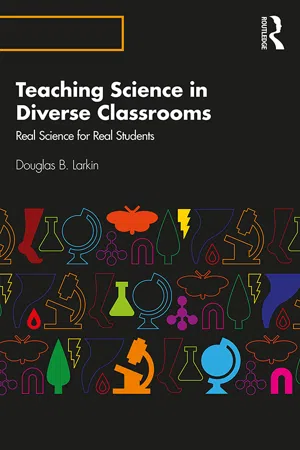
- 134 pages
- English
- ePUB (mobile friendly)
- Available on iOS & Android
About This Book
As a distinctive voice in science education writing, Douglas Larkin provides a fresh perspective for science teachers who work to make real science accessible to all K-12 students. Through compelling anecdotes and vignettes, this book draws deeply on research to present a vision of successful and inspiring science teaching that builds upon the prior knowledge, experiences, and interests of students. With empathy for the challenges faced by contemporary science teachers, Teaching Science in Diverse Classrooms encourages teachers to embrace the intellectual task of engaging their students in learning science, and offers an abundance of examples of what high-quality science teaching for all students looks like.
Divided into three sections, this book is a connected set of chapters around the central idea that the decisions made by good science teachers help light the way for their students along both familiar and unfamiliar pathways to understanding. The book addresses topics and issues that occur in the daily lives and career arcs of science teachers such as:
• Aiming for culturally relevant science teaching
• Eliciting and working with students' ideas
• Introducing discussion and debate
• Reshaping school science with scientific practices
• Viewing science teachers as science learners
Grounded in the Next Generation Science Standards (NGSS), this is a perfect supplementary resource for both preservice and inservice teachers and teacher educators that addresses the intellectual challenges of teaching science in contemporary classrooms and models how to enact effective, reform
Frequently asked questions
Information
Table of contents
- Cover
- Half Title
- Title Page
- Copyright Page
- Dedication
- Table of Contents
- Acknowledgments
- Introduction: Teaching Real Science to Real Students: On Being a Thoughtful Science Teacher and Doing a Good Job
- PART I: Student Ideas Are the Raw Material of Our Work
- 1. Aiming for Culturally Relevant Science Teaching: An Argument for Meeting Our Students Where They Are
- 2. Eliciting Students’ Ideas: Student Ideas as the Raw Material of Science Teachers’ Work
- 3. Every Misconception a Shiny Pebble: Glimpsing Beautiful and Productive Extensions of Prior Knowledge
- 4. Responding to Student Questions Without Giving Answers: “Maybe it Will Just Have to Remain a Mystery Forever”
- PART II: Real Science, Real Students
- 5. HeLa Cells, High-speed Chases, and Other Essential Questions: Because Science Class Should Not Be a Trivia Game
- 6. Reconsidering Labs and Demonstrations for Model-Based Inquiry: Don’t Throw Away Those Owl Pellets Just Yet
- 7. What if the Stork Carried 20-sided Dice? On the Use of Models and Simulations as Tools for Thinking
- 8. Eyes Like a Scientist: Framing Safety as Part of Scientific Practice for Students
- 9. In Praise of Field Trips and Guest Speakers: Bringing the Inside-Out and the Outside-In for Science Learning
- 10. “Before Today I was Afraid of Trees”: Rethinking Nature Deficit Disorder in Diverse Classrooms
- PART III: Science Teacher Learning
- 11. Observing Candles and Classrooms: Learning from Other Teachers by Withholding Judgment
- 12. Mentoring New Science Teachers: Novices Get Better When We Support Them with Good Feedback
- 13. The Black Belt Science Teacher: Differentiation and a Speculative Learning Progression for Science Teachers
- 14. Teaching at the Boundaries of Our Knowledge: Being Knowledgeable Enough About What We Teach to Not Feel Like a Fraud
- 15. Playing School vs. Doing Science: Providing All Students with Access to the Means of Knowledge Generation
- Afterword: Good Reasons for Becoming a Science Teacher
- References
- Index